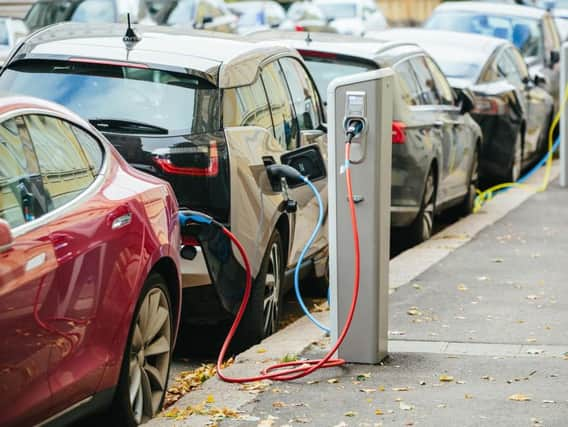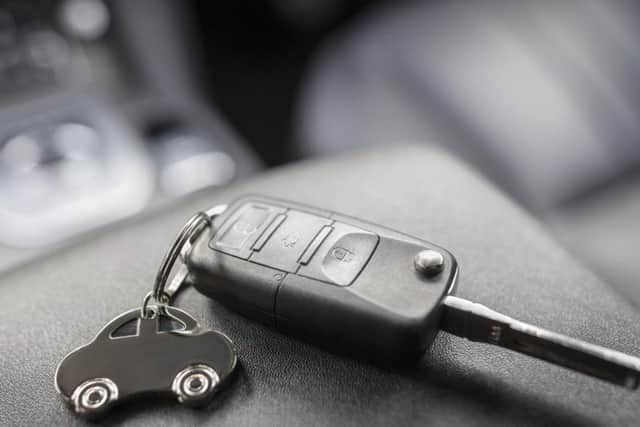Government could pay your firm to go green


There are 38 ‘zones’ in Scotland where air quality safety standards are routinely being breached. That’s according to Friends of the Earth Scotland, which credits air pollution contributing to more than 2,500 early deaths in the country every year.
With 17% of Scotland’s vehicle emissions coming from HGVs and 12% from vans it’s clear that business has its part to play. But why should companies act and does it make economic sense to invest in the environment?
Advertisement
Hide AdAdvertisement
Hide AdBoth petrol and diesel emissions contain chemicals known to cause cancer and other serious illnesses. These include carbon monoxide (CO), particulate matter (PM) and oxides of nitrogen (NOx).


With the majority of Scotland’s businesses running on diesel, it’s a significant problem for staff as well as the wider community.
What’s wrong with diesel?
Diesel engines have been hailed as the ‘greener’ alterative to petrol for the last 20 years or so because they produce less CO2, but that claim has since been called into question.
In September 2015, the dangers of diesel hit the headlines when the story that Volkswagen had been cheating emissions tests broke. However, the first evidence that that NOx and PM were silent killers was published in 2012. Soon after, the World Health Organisation (WHO) declared diesel exhaust a carcinogenic.


The agency said workers exposed to high concentrations of diesel exhaust and PM in the short-term could experience dizziness and headaches as well as eye, nose and throat irritation. Prolonged exposure can increase a worker’s risk of cardiovascular, cardiopulmonary and respiratory disease and lung cancer.
What’s the latest on low-emissions technology?
The latest European standards on emissions, Euro VI, apply to all vehicles manufactured in the last two years. But according to the Society of Motor Manufacturers and Traders (SMMT) diesel trucks and vans on sale today are “the cleanest in history”, and play a vital part in the country’s economy.
Mike Hawes, SMMT chief executive, said: “Commercial vehicles play an essential but often overlooked role in keeping Britain functioning, performing jobs and transporting vital goods and services that we all rely on every day.
“This sector has never been so important to the UK economy – and to British jobs – and diesel’s role in powering these vital vehicles should not be downplayed.”
Advertisement
Hide AdAdvertisement
Hide AdThere is some debate over whether these newer engines are better for the environment, and Greenpeace claims there is “no such thing as clean diesel”.
The campaign group advocates ultra-low emission technology, including electric and hybrid engines, as the only sustainable solution.
“Given the majority of commentators, and indeed many in the car industry, agree that it's a case of ‘when’ not ‘if’ we transition to hybrid and electric vehicle technology, defending an old, polluting technology like diesel will put the economy at a massive disadvantage compared to countries that grasp this opportunity at the first calling,” said Mel Evans, a Greenpeace activist and campaigner.
Is it worth switching my fleet?
In 2015, fleet and business sales accounted for around 70% of ultra-low emissions vehicles (ULEV) sales across the UK as a whole.
Go Ultra Low, a joint initiative between the UK Government and the car industry, said this was because electric vans and cars are cheaper to run than petrol or diesel.
“They benefit from tax breaks, low fuel costs and are offered with sizeable Government grants. In fact, businesses that already operate electric vehicles are saving £1,250 a year per vehicle,” said the group on its website.
“Whole-life cost figures from Lex Autolease illustrate how the higher P11D value of plug-in vehicles is more than off-set by significant fuel savings.”
What’s more, there are fewer moving or wearing parts in ULEVs, meaning less maintenance and servicing costs.
What if I am not ready to switch?
Advertisement
Hide AdAdvertisement
Hide AdThere are things you can do to reduce the impact your company’s current vehicles have on air quality – one of which is a very quick win.
The Switch Off and Breathe campaign is calling on companies to help their staff understand the risks of vehicle emissions. For every two minutes a vehicle is idling, it uses the same amount of fuel it would take to drive one mile, so simply switching off the engine where possible makes a difference to the air, as well as the bottom line.
For more information on the Switch Off and Breathe campaign, go to www.switchoffandbreathe.org